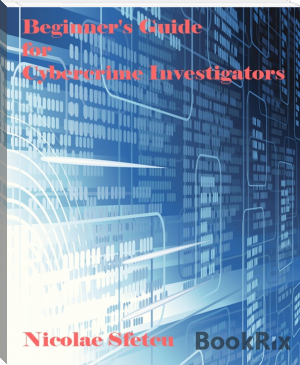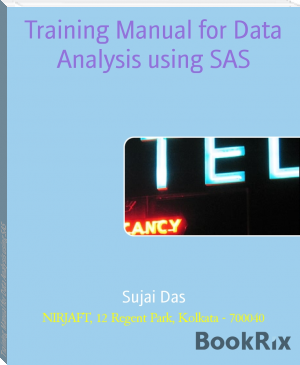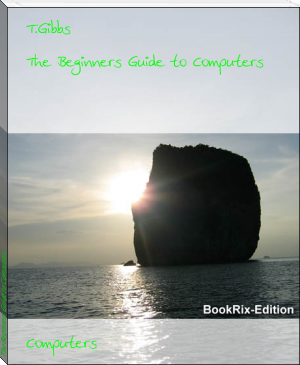Beginner's Guide for Cybercrime Investigators, Nicolae Sfetcu [comprehension books TXT] 📗

- Author: Nicolae Sfetcu
Book online «Beginner's Guide for Cybercrime Investigators, Nicolae Sfetcu [comprehension books TXT] 📗». Author Nicolae Sfetcu
Data files are not the only opportunities revealing information from computing systems. The category of data about the computing system includes recording data auditing, computer activity log, access control list, and other information that can not be printed.
Audit records are a means of tracking all activities affecting some data from the moment of their creation to disposal of the system. They are used by most management programs of computer networks. These records and computer log can provide information about who and when accessed the system, where and for how long, and the operations he made (changes, copying, deleting, etc.)
In addition to the audit records, a large number of companies have special software installed to monitor the use by an employee ‘s own information systems. These programs can provide information about the programs accessed, files used, emails sent and received, websites visited, etc.
Access control list (ACL) is associated with a file list that contains the names of users and groups that have permission to access and modify the file. The user access to those files depends on the employee’s duties or position in the company.
The information that can not be printed are also important sources for investigators. Such information are as follow: date and time attached to each file, information about the creation, access and modification of files (provided, for example, by the text editors), comments and notes not intended for printing, etc.
Table of Contents
Beginner's Guide for Cybercrime Investigators
Computing systems and storage media
Computing devices
Peripheral devices
External drives for media storage
Typology of data stored on specific supports – File systems
Program that allows working with ” inactive” space
Information that can be obtained from the computing system environment
Computer networks
Copper wire in computer networks
Optical fibers
Wireless LAN
Internet and Intranet
Software and services
Client/server architecture
Protocols and Standards
Internet Services
e-Mail
Spam
HTTP
Web address - URL
Web browsers
Browser cookies
Working with web pages
Choosing your favorite web pages
Keeping track of visited web pages
Saving web pages
Proxy servers
Privacy on the Internet
FTP
Instant Messaging
Peer-to-peer networks
Vulnerabilities
The first attacks on the Internet
Cybercrime
Typologies of cyber attackers
Classification of cyber attackers according to their skills and objectives
Classification of risks and incidents in cyberworld
Classification as a list of terms
List of categories
Categories of results
Empirical lists
Events, attacks and incidents
Online security events, actions, and targets
Actions
Targets
Attacks
Tools
Vulnerabilities
Unauthorized results
Cybercrime laws
The concept of "cybercrime"
Investigations
Computer forensic investigations
Digital evidence
Digital sampling during investigations
The suspect
Witnesses in cybercrime
Transporting of samples in laboratory
Analysis of samples
Preparing team members
Computer tools
Convention on Cybercrime
Preamble
Chapter I – Use of terms
Chapter II – Measures to be taken at the national level
Section 1 – Substantive criminal law
Title 1 – Offences against the confidentiality, integrity and availability of computer data and systems
Title 2 – Computer-related offences
Title 3 – Content-related offences
Title 4 – Offences related to infringements of copyright and related rights
Title 5 – Ancillary liability and sanctions
Section 2 – Procedural law
Title 1 – Common provisions
Title 2 – Expedited preservation of stored computer data
Title 3 – Production order
Title 4 – Search and seizure of stored computer data
Title 5 – Real-time collection of computer data
Section 3 – Jurisdiction
Chapter III – International co-operation
Section 1 – General principles
Title 1 – General principles relating to international co-operation
Title 2 – Principles relating to extradition
Title 3 – General principles relating to mutual assistance
Title 4 – Procedures pertaining to mutual assistance requests in the absence of applicable international agreements
Section 2 – Specific provisions
Title 1 – Mutual assistance regarding provisional measures
Title 2 – Mutual assistance regarding investigative powers
Title 3 – 24/7 Network
Chapter IV – Final provisions
Recommendation No. R (95) 13
Appendix to Recommendation No. R (95) 13
I. Search and seizure
II. Technical surveillance
III. Obligations to co-operate with the investigating authorities
IV. Electronic evidence
V. Use of encryption
VI. Research, statistics and training
VII. International co-operation
Rules for obtaining digital evidence by police officers
Standards in the field of digital forensics
Principles in digital evidence
Procedures model for the forensic examination
Hard disk examination
Code of Ethics
Sources and references
Book
Beginner's Guide for Cybercrime Investigators
In the real world there are people who enter the homes and steal everything they find valuable. In the virtual world there are individuals who penetrate computer systems and "steal" all your valuable data. Just as in the real world, there are uninvited guests and people feel happy when they steal or destroy someone else's property, the computer world could not be deprived of this unfortunate phenomenon. It is truly detestable the perfidy of these attacks. For if it can be observed immediately the apparent lack of box jewelry, penetration of an accounting server can be detected after a few months when all clients have given up the company services because of the stolen data came to competition and have helped it to make best deals.
Cybercrime is a phenomenon of our time, often reflected in the media. Forensic investigation of computer systems has a number of features that differentiate it fundamentally from other types of investigations. The computer itself is the main source of information for the investigator.
Digital edition (EPUB, Kindle, PDF): https://www.setthings.com/en/e-books/beginners-guide-cybercrime-investigators/
Print edition: https://www.createspace.com/5146499
Publication Date: June 17, 2014
ISBN-13: 978-1505344332
ISBN-10: 1505344336
ASIN: B01M17OB8V
BISAC: Computers / Internet / Security
About
Nicolae Sfetcu
Experience in the domains of engineering, Quality Assurance, electronics and Internet services (translation, web design, Internet marketing, web business solutions).
Owner and manager with MultiMedia
Developer of MultiMedia Network
Partner with MultiMedia in several European and national research and development projects
Project Coordinator for European Teleworking Development Romania (ETD)
Member of Rotary Club Bucuresti Atheneum
Cofounder of the regional association and president of the Mehedinti Branch of Romanian Association for Electronic Industry and Software
Initiator, cofounder and president of Romanian Association for Telework and Teleactivities
Member of Internet Society
Initiator, cofounder and ex-president of Romanian Teleworking Society
Cofounder and ex-president of the Mehedinti Branch of the General Association of Engineers in Romania
Physicist engineer - Bachelor of Physics, Major Nuclear Physics
Internal auditor for the Quality Management Systems
Specialist in industrial Nondestructive Testing
Attested for Quality Assurance
Hundreds of publications (books, e-books, articles), mainly from the IT domain.
Languages: Romanian, French, English
Services
web design, e-commerce and other web applications * internet marketing, SEO, online advertising, branding * software localization, English - Romanian - French translation * articles, desktop publishing, secretarial services * powerpoint, word and pdf presentation, image, audio and video editing * book and e-book conversion, editing and publishing , isbn
Contact
Tel./ WhatsApp: +40 745 526 896
Email: nicolae@sfetcu.com
Skype: nic01ae
MultiMedia: http://www.multimedia.com.ro/
Web Portal: https://www.setthings.com/
Facebook/Messenger: https://www.facebook.com/nicolae.sfetcu
Twitter: http://twitter.com/nicolae
LinkedIn: http://www.linkedin.com/in/nicolaesfetcu
Google Plus: https://www.google.com/+NicolaeSfetcu
YouTube: https://www.youtube.com/c/NicolaeSfetcu
Publication Date: 04-09-2018
All Rights Reserved





Comments (0)